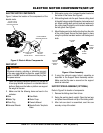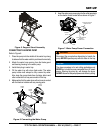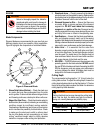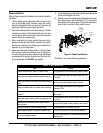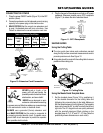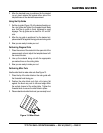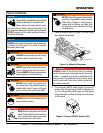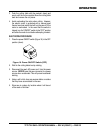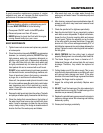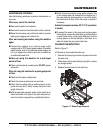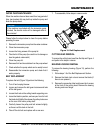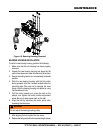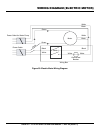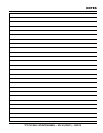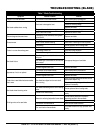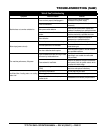
PAGE 24 — TP7X TILE SAW • OPERATION MANUAL — REV. #0 (03/04/11)
MAINTENANCE
A good preventive maintenance program of regular
inspection and care will increase life and improve the
performance of the saw and cutting blades.
BASIC MAINTENANCE
1. Tighten loose nuts or screws and replace any cracked
or broken parts.
2. Clean the machine frequently. DO NOT use aggressive
cleaners (i.e. containing solvents). DO NOT use high
high-pressure water jets, aggressive detergents or
solutions and liquids with a temperature exceeding
86°. Use a fluff-free cloth only. Use a cloth which may
be lightly moistened only for removing dust and dirt.
Hard packed dirt can be removed with a soft brush.
DO NOT let any water/cleaning liquid/vapor penetrate
into the electric motor, connectors/plugs, switches, etc.
Cover all apertures, holes in the housing, connectors
or plugs, etc, or seal them with adhesive tape.
Use a soft, low-pressure water jet and a brush to rinse
dirt and incrustations away. Be particularly careful when
near hazardous parts of the machine (e.g. switch,
motor). Clean the motor and switches only by wiping
with a moist cloth.
3. Remove the belt guard and clean the pulleys. The belts
and pulleys will wear rapidly if excessive dust builds up.
4. Clean the sludge that accumulates on the bottom of
the water tray at least once a day and refill with clean
water. It may be necessary to clean the tray out twice
a day in heavy cutting. The sludge is abrasive and will
shorten the life of the water pump and blades.
WARNING
Whenever cleaning, adjusting, or lubricating any part of
the saw, MAKE CERTAIN to do the following:
• Place power ON/OFF switch to the OFF position.
• Disconnect power cord from AC source.
• NEVER attempt to check the V-belt with the engine
running. Severe bodily injury can occur.
5. After each day's use, run clean water through the
water pump and water hoses. This extends pump and
blade life.
6. After cleaning, remove all covers and adhesive tape. All
screws or nuts which may have been loosened must
be retightened.
7. Check the spindle bolt for tightness periodically.
8. Keep the drive belt tight. It is very important to replace
worn belts as soon as possible. To adjust belt tension,
loosen the four (4) motor mounting bolts and remove
the belt guard. Tighten the adjusting nut on the back
of the motor plate to increase the tension. Proper belt
tension is 4-5 lbs. of force with approximately 3/16" of
belt deflection measured at a point midway between the
pulleys. Tighten the motor mounting bolts and reattach
the belt guard.
9. MAKE CERTAIN that the cutting head is aligned
properly. Misalignment can adversely affect blade life.
10. The blade flanges must have a diameter of 4".
Undersized flanges will reduce blade life and cause
breakage. Therefore, they should be replaced at
once.
11. Cutting blades must fit the arbor snugly. This is very
important with diamond blades as pounding will occur
and serious blade damage can result. If the arbor
shoulder of the inner blade flange is grooved from blade
slippage, the flange must be replaced.
12. Inspect the cutting table periodically. Replace worn
parts.
13. DO NOT “rinse” the bearings of the drive elements to
prevent them from running dry. The ball bearings of the
machine are permanently lubricated.
14. Replace the spindle bearings as soon as they begin to
make any strange noises. Worn bearings can destroy
blades very quickly.
15. Grease pivot bearings periodically.



